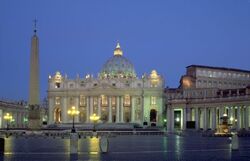prayer and worship - Church organization and community - Catholic institutions, personnel and demographics - Cultural influence - History - Video -
Roman Catholic Church | |
|---|---|
| Organisation | |
| Pope - Pope Benedict XVI
College of Cardinals Ecumenical Councils Episcopal polity Latin Rite Eastern Catholic Churches | |
| Background | |
| History • Christianity
Catholicism • Apostolic Succession Four Marks of the Church Ten Commandments Crucifixion & Resurrection of Jesus Ascension • Assumption of Mary Criticism of Roman Catholicism | |
| Theology | |
| Trinity (Father, Son, Holy Spirit)]]
Theology • Apologetics Divine Grace • Sacraments Purgatory • Salvation Original sin • Saints • Dogma Virgin Mary • Mariology Immaculate Conception of Mary | |
| Liturgy and Worship | |
| Roman Catholic Liturgy
Eucharist • Liturgy of the Hours Liturgical Year • Biblical Canon | |
| Rites | |
| Roman • Armenian • Alexandrian | |
| Portals | |
The Catholic Church traces its foundation to Jesus and the twelve Apostles.[30] It sees the bishops of the Church as the successors of the apostles and the pope in particular as the successor of Peter, the leader of the apostles.[31][32] Catholics cite Jesus' words in the Gospel according to Matthew, to support this view: "... you are Peter, and on this rock I will build my church ... I will give you the keys to the kingdom of heaven. Whatever you bind on earth shall be bound in heaven; whatever you loose on earth shall be loosed in heaven."[9][20][33] According to Catholic belief, this promised church was brought fully into the world when the Holy Spirit came upon the apostles in the event known as Pentecost.[32]
Some scholars agree that the Church was founded by Jesus and that the historical record confirms that it was considered a Christian doctrinal authority from its beginning.[15][17] Henry Chadwick cites a letter from Pope Clement I to the church in Corinth (c. 95) as evidence of a presiding Roman cleric who exercised authority over other churches.[34] Other scholars disagree with these interpretations. Eamon Duffy for instance, affirms the existence of a Christian community in Rome and that Peter and Paul "lived, preached and died" there,[35] but doubts that there was a ruling bishop in the Roman church in the first century, and questions the concept of apostolic succession.[36]
The Church believes that its mission is founded upon Jesus' command to his followers to spread the faith across the world:[17] "Go therefore and make disciples of all nations, baptizing them in the name of the Father, and of the Son and of the Holy Spirit, teaching them to observe all that I have commanded you: and Lo, I am with you always, until the close of the age".[37][38][39] Pope Benedict XVI summarized this mission as a threefold responsibility to proclaim the word of God, celebrate the sacraments, and exercise the ministry of charity.[40] As part of its ministry of charity the Church runs Catholic Relief Services, Catholic Charities, Caritas Internationalis, Catholic schools, universities, hospitals, shelters and ministries to the poor, as well as ministries to families, the elderly and the marginalized